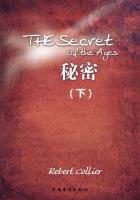But if it is absurd to say that a man is in death before he reaches death (for to what is his course running as he passes through life, if already he is in death?), and if it outrage common usage to speak of a man being at once alive and dead, as much as it does so to speak of him as at once asleep and awake, it remains to be asked when a man is dying? For, before death comes, he is not dying but living; and when death has come, he is not dying but dead.The one is before, the other after death.When, then, is he in death so that we can say he is dying? For as there are three times, before death, in death, after death, so there are three states corresponding, living, dying, dead.And it is very hard to define when a man is in death or dying, when he is neither living, which is before death, nor dead, which is after death, but dying, which is in death.For so long as the soul is in the body, especially if consciousness remain, the man certainly lives; for body and soul constitute the man.And thus, before death, he cannot be said to be in death, but when, on the other hand, the soul has departed, and all bodily sensation is extinct, death is past, and the man is dead.Between these two states the dying condition finds no place; for if a man yet lives, death has not arrived; if he has ceased to live, death is past.Never, then, is he dying, that is, comprehended in the state of death.So also in the passing of time,--you try to lay your finger on the present, and cannot find it, because the present occupies no space, but is only the transition of time from the future to the past.Must we then conclude that there is thus no death of the body at all? For if there is, where is it, since it is in no one, and no one can be in it? Since, indeed, if there is yet life, death is not yet; for this state is before death, not in death: and if life has already ceased, death is not present; for this state is after death, not in death.
On the other hand, if there is no death before or after, what do we mean when we say "after death," or "before death?" This is a foolish way of speaking if there is no death.And would that we had lived so well in Paradise that in very truth there were now no death ! But not only does it now exist, but so grievous a thing is it, that no skill is sufficient either to explain or to escape it.
Let us, then, speak in the customary way,--no man ought to speak otherwise,--and let us call the time before death come, "before death;" as it is written, "Praise no man before his death."(1)And when it has happened, let us say that "after death" this or that took place.And of the present time let us speak as best we can, as when we say, "He, when dying, made his will, and left this or that to such and such persons,"--though, of course, he could not do so unless he were living, and did this rather before death than in death.And let us use the same phraseology as Scripture uses; for it makes no scruple of saying that the dead are not after but in death.So that verse, "For in death there is no remembrance of thee."(2) For until the resurrection men are justly said to be in death; as every one is said to be in sleep till he awakes.However, though we can say of persons in sleep that they are sleeping, we cannot speak in this way of the dead, and say they are dying.For, so far as regards the death of the body, of which we are now speaking, one cannot say that those who are already separated from their bodies continue dying.
But this, you see, is just what I was saying,--that no words can explain now either the dying are said to live, or now the dead are said, even after death, to be in death.For how can they be after death if they be in death, especially when we do not even call them dying, as we call those in sleep, sleeping; and those in languor, languishing; and those in grief, grieving; and those in life, living? And yet the dead, until they rise again, are said to be in death, but cannot be called dying.
And therefore I think it has not unsuitably nor inappropriately come to pass, though not by the intention of man, yet perhaps with divine purpose, that this Latin word moritur cannot be declined by the grammarians according to the rule followed by similar words.For oritur gives the form ortus est for the perfect;and all similar verbs form this tense from their perfect participles.But if we ask the perfect of moritur, we get the regular answer mortuus est, with a double u.For thus mortuus is pronounced, like fatuus, arduus, conspicuus, and similar words, which are not perfect participles but adjectives, and are declined without regard to tense.But mortuus, though in form an adjective, is used as perfect participle, as if that were to be declined which cannot be declined; and thus it has suitably come to pass that, as the thing itself cannot in point of fact be declined, so neither can the word significant of the act be declined.
Yet, by the aid of our Redeemer's grace, we may manage at least to decline the second.For that is more grievous still, and, indeed, of all evils the worst, since it consists not in the separation of soul and body, but in the uniting of both in death eternal.
And there, in striking contrast to our present conditions, men will not be before or after death, but always in death; and thus never living, never dead, but endlessly dying.And never can a man be more disastrously in death than when death itself shall be deathless.
CHAP.12.--WHAT DEATH GOD INTENDED, WHEN HE THREATENED OUR FIRST PARENTSWITH
DEATH IF THEY SHOULD DISOBEY HIS COMMANDMENT.















